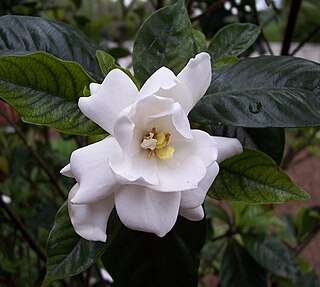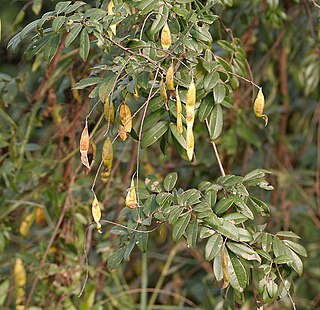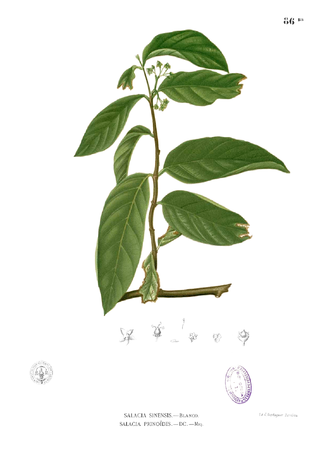
Mangifera is a genus of flowering plants in the cashew family, Anacardiaceae. It contains about 69 species, with the best-known being the common mango. The center of diversity of the genus is in the Malesian ecoregion of Southeast Asia, particularly in Sumatra, Borneo, and the Malay peninsula. They are generally canopy trees in lowland rainforests, reaching a height of 30–40 m (98–131 ft).

Gardenia is a genus of flowering plants in the coffee family, Rubiaceae, native to the tropical and subtropical regions of Africa, Asia, Madagascar, Pacific Islands, and Australia.

Syzygium is a genus of flowering plants that belongs to the myrtle family, Myrtaceae. The genus comprises about 1200 species, and has a native range that extends from Africa and Madagascar through southern Asia east through the Pacific. Its highest levels of diversity occur from Malaysia to northeastern Australia, where many species are very poorly known and many more have not been described taxonomically. One indication of this diversity is in leaf size, ranging from as little as a half inch to as great as 4 ft 11 inches by sixteen inches in Syzygium acre of New Caledonia.

Pterospermum is a genus of flowering plants in the mallow family Malvaceae. Its species are tropical trees that range from southern China across tropical Asia.

Derris is genus of leguminous plants. It contains 65 species, which range from eastern Africa to the Indian subcontinent, Southeast Asia, New Guinea, northern Australia, and the southwest Pacific islands. The roots of D. elliptica contain rotenone, a strong insecticide and fish poison.

Glycosmis is a genus of flowering plants in the citrus family, Rutaceae and tribe Clauseneae. It is in the subfamily Aurantioideae, which also includes genus Citrus. It is a genus of the subtribe Clauseninae, which are known technically as the remote citroid fruit trees.

Pleiospermium is a genus of plant in family Rutaceae.

Saprosma is a genus of flowering plants in the family Rubiaceae. There are about 40 species distributed from south China to tropical Asia.

Salacia is a genus of plants in the family Celastraceae. They are woody climbers naturally found in tropical regions.

Atractocarpus is a genus of flowering plants in the family Rubiaceae. Its members are commonly known as native gardenias in Australia. The genus name is derived from the Ancient Greek terms atractos "spindle", and karpos "fruit", from the spindle-shaped fruit of the type species.

Artabotrys is a genus of plants in the Annonaceae family. There are over 100 species in the Old World tropics, with 31 species in Africa. It is part of the custard apple family (Annonaceae). All species are small trees or shrubs with a tendency to climb. Leaves are simple and alternate, without hairs. Bisexual flowers are borne singly or in clusters opposite the leaves. The 6-petalled flowers are scented, and the plant bears fleshy fruits.

Polyspora is a genus of flowering plants in the tea family (Theaceae). It includes 47 species, which range from India through Indochina, southern China, Malesia, Taiwan and New Guinea.

Atalantia is a genus of flowering plants in the citrus family, the Rutaceae.

Mezoneuron is a genus of flowering plants in the legume family, Fabaceae. It belongs to the subfamily Caesalpinioideae and the tribe Caesalpinieae.

Hippocratea is a genus of flowering plants in the family Celastraceae, usually lianas, native to tropical and subtropical North America, South America and Africa.
Paul Alfred Pételot (1885–1965) was a French botanist and entomologist, whose primary scholarly focus was on medicinal plants in Southeast Asia. Some sources list his date of death as 1940, but several herbaria specimens are recorded as being collected by him up until 1944 including Carex kucyniakii (1944), Teijsmanniodendron peteloti (1941), Amalocalyx microlobus (1941), Amalocalyx microlobus (1942), Trichosanthes kerrii (1944) and Siraitia siamensis (1944). In addition, he continued to author publications through the 1950s, though it is possible these are posthumous.

Decaschistia is a genus of flowering plants belonging to the family Malvaceae.

Sphaerocoryne is a genus of flowering plants belonging to the family Annonaceae.
















